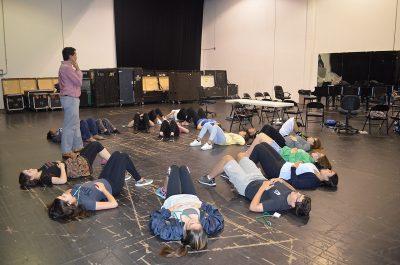Performers always need to be conscious of their physical presence on stage. The Alexander Technique, developed in the 1890s by Australian actor Frederick Matthias Alexander, helps actors immerse themselves in their work by adjusting the posture, breathing and movement habits that develop over time.

Alexander faced respiratory issues as a child that nearly threatened his theater career. He sought medical help for persistent hoarseness, but eventually found the key while looking into a mirror.
It was not the vocals themselves that were the issue, but how he was positioned.
The Alexander Technique is used today as a “mental discipline” of managing one’s movement to ease tension in the body, to promote balance, coordination and movement, according to the Harvard Health Blog.
Students in the Boston University College of Fine Arts can take courses to master the Alexander Technique in both theater and music.
Betsy Polatin, master lecturer in the CFA, developed the courses as a combination of Alexander Technique methods and her own work and research in movement education and acting.
“You could call it a self-improvement technique,” Polatin said, “that you learn to pay attention to what you’re doing, and change the neuromuscular system, and decide to do something else.”
CFA senior Neil Kelly has taken courses in the Alexander program since his first year at BU. In a freshman year Alexander course, Kelly recalled the piano lessons he took as a child to perform a song for a final exam.
After he worked on the piece in class, the professor helped him adjust his posture and Kelly found he had forgotten how to play the song entirely.
“I forgot it because I wasn’t doing my habitual tension that I had as a child,” he said, “and it brought me back completely to when I would force myself to play the piano and be very kind of uptight about it.”
Kelly said he realized in order to play the song without the posture and tension problems developed in his youth, he would need his body to relearn the song without that associated stress.
“It actually made me so curious about how the body and the mind and learning and nurturing and all of that works,” he said. “That moment, specifically freshman year, was fascinating to me that the things we learn really are in our bodies and how we learn them is in our bodies.”
Alexander Technique exercises also have the capacity to break down emotional barriers by addressing how that tension manifests in the body.
Fellow CFA senior Julian Manjerico described one moment during his Alexander Technique classes when he experienced this kind of emotional breakthrough.
Growing up in a community where athletics were highly regarded, Manjerico said he would “always clench [his] stomach” as a way to hide his physique at school.
“I just realized, being in [the] class, how much I still clench onto my stomach,” he said. “There was a moment when I just released my stomach, and then all of my emotions came out with it.”
Manjerico said learning how to let go of both the emotional and physical tension he had been harboring through this habit was very impactful for himself personally and as an actor.
“It felt like I was holding on to just a bunch of trauma, and being able to release that was the first step in me feeling the things that I was trying to repress for decades really,” he said. “It was a very big moment of me as a person understanding how to access my emotions then as an actor.”
He said now, after working his way through the Alexander courses at BU, the practices have helped translate to his professional career.
“Right before I’m about to go out [on stage], I do a full body scan of ‘Am I holding tension anywhere? Is there anywhere I need to release?’” he said. “And then I just go out on stage and trust that that work is in me.”
Kelly said working the Alexander Technique into his acting comes in more subtle ways, such as how the character he is playing drinks a glass of water.
“Maybe I pick it up with my left hand and I just start gulping it down, but then what if my character is a very indirect person, and they sometimes have to saunter over to the glass,” he said. “They’re very subtle things, but they really do make up a performance.”
While the Alexander Technique program courses are part of the curriculum at BU, Kelly said in his experience, the work students do in class is not so much focused on specific performances, rather taking a holistic approach to their habits and movement as people.
“I personally have found Alexander to probably be one of the most universally helpful things as an actor, because it doesn’t necessarily have to relate to acting,” he said. “It teaches you how to be a human being at the end of the day.”


























































































































